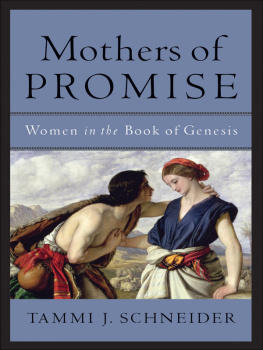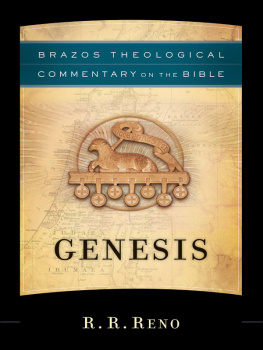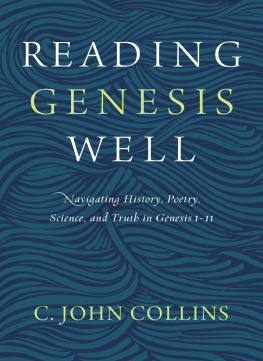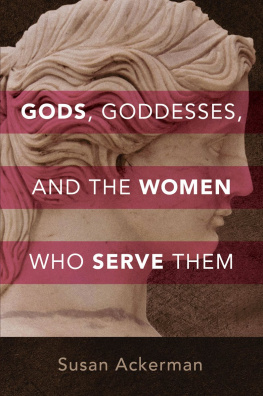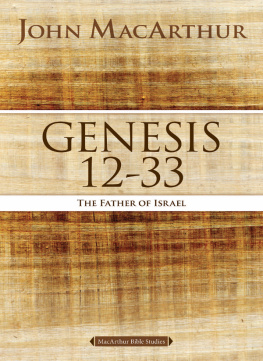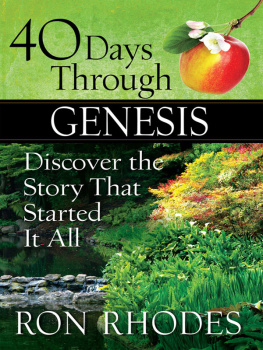Tammi J. Schneider - Mothers of Promise: Women in the Book of Genesis
Here you can read online Tammi J. Schneider - Mothers of Promise: Women in the Book of Genesis full text of the book (entire story) in english for free. Download pdf and epub, get meaning, cover and reviews about this ebook. year: 2008, publisher: Baker Publishing Group, genre: Children. Description of the work, (preface) as well as reviews are available. Best literature library LitArk.com created for fans of good reading and offers a wide selection of genres:
Romance novel
Science fiction
Adventure
Detective
Science
History
Home and family
Prose
Art
Politics
Computer
Non-fiction
Religion
Business
Children
Humor
Choose a favorite category and find really read worthwhile books. Enjoy immersion in the world of imagination, feel the emotions of the characters or learn something new for yourself, make an fascinating discovery.
- Book:Mothers of Promise: Women in the Book of Genesis
- Author:
- Publisher:Baker Publishing Group
- Genre:
- Year:2008
- Rating:3 / 5
- Favourites:Add to favourites
- Your mark:
- 60
- 1
- 2
- 3
- 4
- 5
Mothers of Promise: Women in the Book of Genesis: summary, description and annotation
We offer to read an annotation, description, summary or preface (depends on what the author of the book "Mothers of Promise: Women in the Book of Genesis" wrote himself). If you haven't found the necessary information about the book — write in the comments, we will try to find it.
Mothers of Promise: Women in the Book of Genesis — read online for free the complete book (whole text) full work
Below is the text of the book, divided by pages. System saving the place of the last page read, allows you to conveniently read the book "Mothers of Promise: Women in the Book of Genesis" online for free, without having to search again every time where you left off. Put a bookmark, and you can go to the page where you finished reading at any time.
Font size:
Interval:
Bookmark:
Mothers of
PROMISE
Mothers of
PROMISE
Women in the Book of Genesis
TAMMI J. S CHNEIDER

2008 by Tammi J. Schneider
Published by Baker Academic
a division of Baker Publishing Group
P.O. Box 6287, Grand Rapids, MI 495166287
www.bakeracademic.com
Printed in the United States of America
All rights reserved. No part of this publication may be reproduced, stored in a retrieval system, or transmitted in any form or by any meansfor example, electronic, photocopy, recordingwithout the prior written permission of the publisher. The only exception is brief quotations in printed reviews.
Library of Congress Cataloging-in-Publication Data
Schneider, Tammi J. (Tammi Joy), 1962
Mothers of Promise : women in the book of Genesis / Tammi J. Schneider.
p. cm.
Includes bibliographical references.
ISBN 978-0-8010-2949-3 (pbk.)
1. Matriarchs (Bible). 2. Bible. O.T. GenesisBiography. 3. Bible. O.T. GenesisCriticism, interpretation, etc. 4. Women in the Bible. I. Title.
BS575.S36 2008
222 .110922082dc22
2008009542
Unless otherwise indicated, Scripture quotations are the authors own translation.
Scripture quotations labeled KJV are from the King James Version of the Bible.
Scripture quotations labeled NJPS are from the New Jewish Publication Society Version 1985 by The Jewish Publication Society. All rights reserved.
Scripture quotations labeled NRSV are from the New Revised Standard Version of the Bible, copyright 1989, by the Division of Christian Education of the National Council of the Churches of Christ in the United States of America. Used by permission. All rights reserved.
Scripture quotations labeled RSV are from the Revised Standard Version of the Bible, copyright 1952 [2nd edition, 1971] by the Division of Christian Education of the National Council of the Churches of Christ in the United States of America. Used by permission. All rights reserved.

In loving memory of my grandmother
Kate Braunstein Litwak
Contents
Part 2 Mothers of Potential Heirs (or Slaves, Concubines, Daughters,
and Daughters-in-Law)
M any people deserve my sincere thanks for their help in the writing of this book.
I would like to thank all the people at Baker Academic who worked with me on this project. They have all been helpful and thorough. In particular I would like to single out Jim Kinney, who originally asked me what ideas I had and suggested I write the book.
There are too many students from my classes at Claremont Graduate University, Claremont School of Theology, and the Claremont Colleges to thank individually, but all the students in my classes have contributed to this work by asking the hard questions and working through many of these issues with me. In particular, I would like to single out Leah Rediger Schulte, my research assistant, for her help with all aspects of the manuscript. The women of the Orange County Jewish Feminist Institute are my students, friends, and mentors. I cannot thank them enough for what they have contributed to my research.
I am lucky to work with the two best colleagues in Hebrew Bible: Kristin De Troyer and Marvin A. Sweeney. Both are outstanding scholars who are extremely productive and yet they are always there to discuss anything from research to the personal.
Finally, my family deserves my sincerest thanks. I am lucky to have the love and support of my parents and siblings as well as a large array of cousins, some a bit removed genealogically but extremely close and loving personally. My children, Sarah and Kalilah, and husband, Farooq Hamid, bring me endless joy, ground me, and teach me what matters in the world.
E ve got us kicked out of the garden, Sarah is mean to Hagar, Hagar runs away, Lots wife does not listen and turns into a pillar of salt, her daughters sleep with their father, Rebekah tricks her old husband and firstborn son, Leah is a cow, her pretty sister Rachel is loved, Dinah deserves her rape, Tamar prostitutes herself, Potiphars wife is a liar. Such is an overview of how religious leaders and scholars have described the women of Genesis.
Are these legitimate representations of female characters in Genesis? Many studies assume that women in Genesis are part of someone elses story. As secondary characters they have been treated as topics not worthy of their own category. Yet a careful reading of Genesis reveals that women function as determiners of who receives the Israelite Deitys promise.
Recent studies show womens roles in the narrative are more than just footnotes to the men. Work on Sarah reveals that she is as important to the fulfillment of the Israelite Deitys promise as Abraham.
At issue is how to consider the topic. Following the narrative from beginning to end does not allow for an analysis of the role and function of women, nor does it highlight those elements as part of the story. Inherent in approaching these women in categories is that they must be defined before they are investigated, something I tried to avoid in my initial research.
The data reveal that women in Genesis determine who receives the promise from the Israelite Deity. The designated heir is always male, yet the right mother is critical in that choice. The role of women as wives is significant, but their role as mothers is even more important. This thesis holds true even for Eve and for Adah and Zillah, who predate the divine promise.
The methodology for this book led me to this thesis. Women in the biblical text are seldom considered alone; instead, they are compared to others in the text, usually women. The problem with this approach is that because their characters are already so connected to the actions of others, it is difficult to see what actions they carry out and how they are defined.
In this volume I examine each female character who is the singular subject of at least one verb by using a new approach, verbing the character. The approach examines each character from four perspectives: their description, their use as the subject of verbs, their use as the object of either verbs or prepositional phrases, and their relationships.
A few comments are necessary about how I employ this approach in the following study. What counts as a description is not just an adjective but includes nouns applied to the character. Because the Hebrew language does not have a large class of adjectives, and nouns, especially kinship terms, define and describe characters, such nouns will be treated as descriptions of the characters. All the references are embedded in a literary text; thus, just because a character is the subject of a verb does not necessarily mean they are in charge of a situation. The Hebrew Bible was originally written in Hebrew (and Aramaic), and what appears in English translation as someone functioning as the subject may not be so in the original Hebrew. Because Hebrew grammar differs from English, there are places where the distinction between someone functioning as the subject is not as clear-cut as it may appear in a translation, and I will treat those cases that seem to best reflect the agency of that character.
A by-product of this method is that because many of the descriptions of women are in verses where they are subjects and objects, there is repetition. Other cases of duplication occur because many women are the object of another womans actions and so the same situations will be repeated in different chapters. I have made every effort to minimize this repetition. Duplication is especially problematic where there is already a repetition in the Hebrew text. The problem is that each context reads differently depending on the angle from which it is viewed. I hope the reader will consider the redundancy useful for emphasizing how a different angle or lens reflects the biblical text more thoroughly.
Next pageFont size:
Interval:
Bookmark:
Similar books «Mothers of Promise: Women in the Book of Genesis»
Look at similar books to Mothers of Promise: Women in the Book of Genesis. We have selected literature similar in name and meaning in the hope of providing readers with more options to find new, interesting, not yet read works.
Discussion, reviews of the book Mothers of Promise: Women in the Book of Genesis and just readers' own opinions. Leave your comments, write what you think about the work, its meaning or the main characters. Specify what exactly you liked and what you didn't like, and why you think so.

